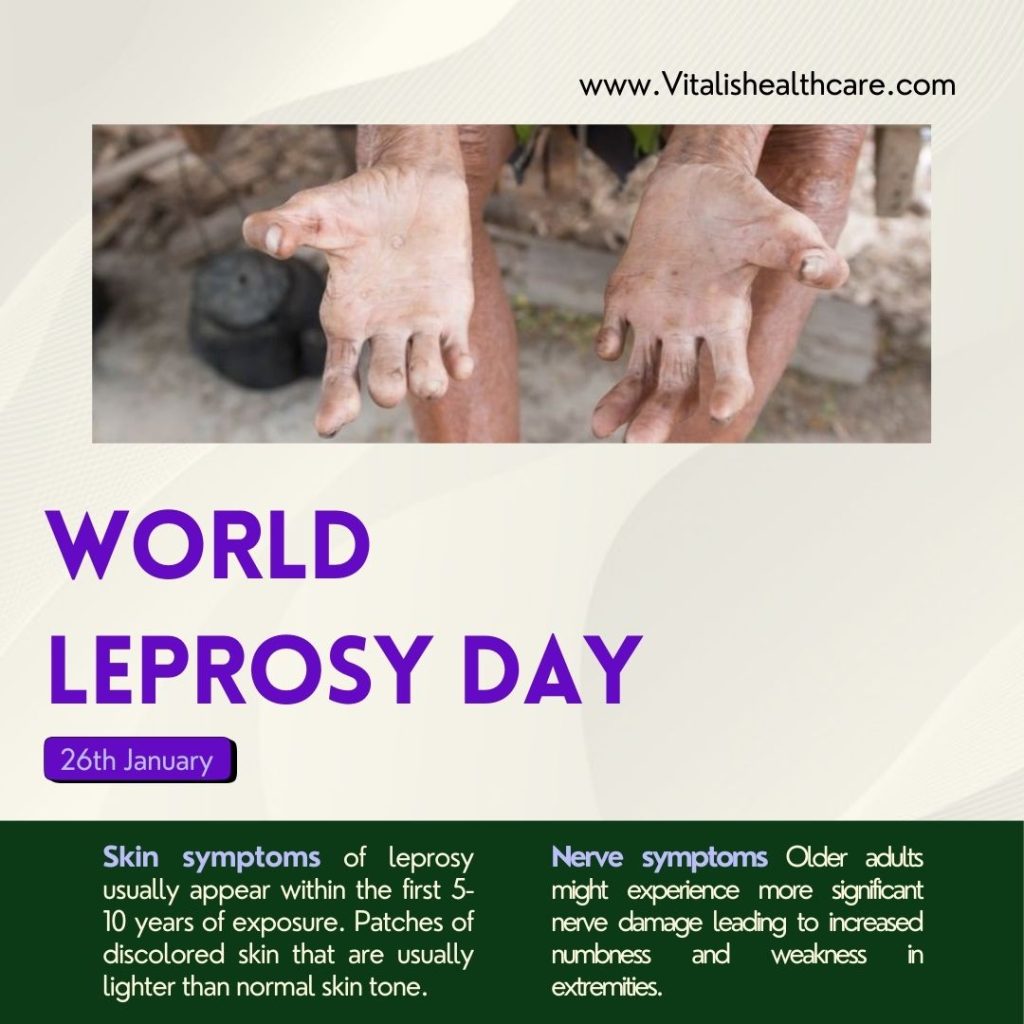Leprosy, a disease that has plagued humanity for centuries, continues to affect millions globally. While treatment has made significant strides, the impact on seniors remains a crucial concern. In fact, older adults often face unique challenges in managing the disease, including complications that can arise due to age related changes in the body.
SYMPTOMS OF LEPROSY IN SENIORS
Leprosy primarily affects the skin, nerves in the hands and feet and mucous membranes (moist, inner linings) of the eyes and nose. Untreated leprosy can lead to physical deformities, blindness, and kidney failure, among other complications.
Symptoms of leprosy includes;
- Skin Symptoms: Skin symptoms of leprosy usually appear within the first 5-10 years of exposure. Patches of discolored skin that are usually lighter than your normal skin tone are often the first sign of leprosy. Numbness of the affected areas usually makes it difficult to distinguish between hot and cold. Examples of these skin related symptoms include;
- Loss of hair in affected areas of the skin
- Dry, thick or stiff skin
- Loss of eyelashes or eyebrows
- Skin patches that may be red or have a loss of pigmentation.
- Nerve Symptoms: Older adults might experience more significant nerve damage leading to increased numbness and weakness in extremities, which can complicate mobility and daily activities. mExamples of nerve symptoms can include;
- Muscle weakness
- Impaired vision or blindness due to damage in the optic nerves.
- Paralysis(partial or complete loss of movement or sensation)
- Loss of reflexes
- Burning sensation in the skin.
Advanced symptoms include; Sores on the sole of the feet that don’t heal, Blindness, Deformities of the nose, hands, and feet, shorter toes and fingers and many more.
In seniors, the symptoms of leprosy may be less pronounced, and there may be less immediate nerve involvement, which is why it is advisable for seniors or their caregivers to seek medical attention if they notice any symptom, no matter how small and start treatment as soon as possible. Early detection and treatment of these symptoms prevents further tissue damage, stops the spread of the disease and prevents serious health complications.
HOME CARE FOR SENIORS WITH LEPROSY
At home care for seniors with leprosy involves important considerations to ensure their comfort and well being. Here are some basic tips:
- Medication: Ensure that the senior follows their prescribed treatment plan and keep track of dosages which may include antibiotics.
- Skin care: Always keep the skin clean and moisturized to prevent infections. Use gentle and non-irritating soaps and body washes and regularly inspect the skin for any lesions or changes.
- Nutrition: Encourage the intake of nutritious food, fruits and vegetables to support overall health and recovery.
- Regular checkups: Schedule regular visits with health care providers to monitor the condition and adjust treatment if necessary.
- Enlisting Home Caregivers: Home caregivers can help seniors manage leprosy effectively at home by assisting with their nutrition, medication, domestic chores and providing companionship while promoting their quality of life.
How To Reduce Stigma and Provide Community Support For Leprosy Patients
Leprosy remains a major stigmatizing condition. It is one of the oldest and most widespread disease-related stigmas in the world. While it is completely treatable and curable, leprosy is still an epitome of stigma and remains to be a social disease. This is because of the long standing social stereotypes attached to it which are instigated by physical attributes such as deformities, wet wounds and reactions on the skin.
Some ways of reducing stigma in Leprosy patients include:
- Awareness Campaigns: By organizing seminars and workshops, health care professionals can educate the public about leprosy and help dispel myths that contribute to stigma.
- Inclusive Activities: Organizing events that include individuals with leprosy can promote social interaction and encourage acceptance.
- Community Support: Communities can provide a supportive environment, as seniors may experience feelings of isolation or stigma. Communities can also advocate for seniors with leprosy, provide resources such as health care services and establish support groups to create safe spaces for sharing experiences and fostering connection.
- Caregiver Support: Caregivers, particularly companion caregivers, can help provide a sense of community and connection to leprosy patients with their non judgmental presence.
By implementing these strategies, communities can significantly reduce stigma and foster an environment of acceptance and support for individuals affected by leprosy.
At Vitalis healthcare, we understand the unique challenges faced by seniors with leprosy. We provide compassionate care tailored specifically for your needs ensuring you receive the medical attention and emotional support you need.
Contact us today if you need a home caregiver or companion caregiver. You do not have to face this journey alone, we are here to support you every step of the way.
Phone Number: 240.716.6874
Email: info@vitalishealthcare.com
Location: We provide our services in every county in the State of Maryland, United States of America.
Office Address: 8757 Georgia Avenue Suite 440 Silver Spring, MD 20910


